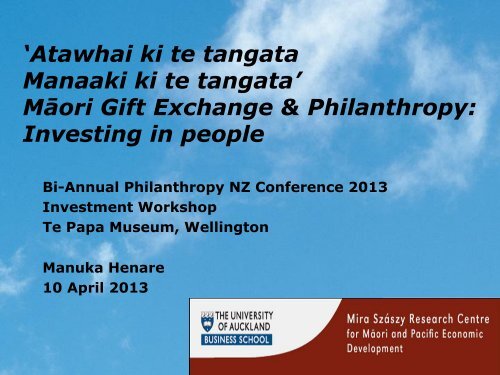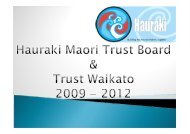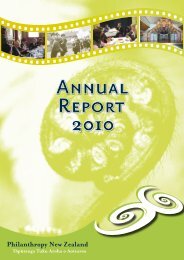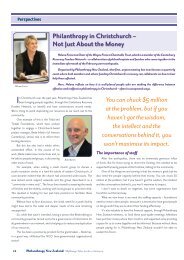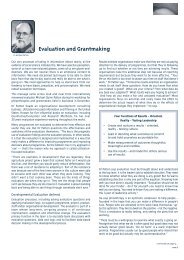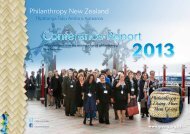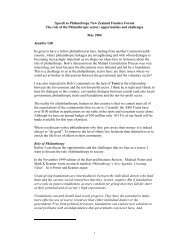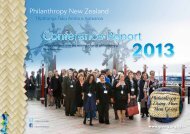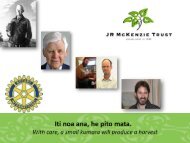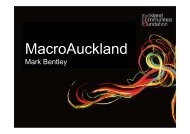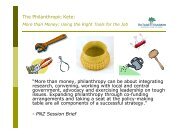Māori Gift Exchange & Philanthropy - Philanthropy New Zealand
Māori Gift Exchange & Philanthropy - Philanthropy New Zealand
Māori Gift Exchange & Philanthropy - Philanthropy New Zealand
You also want an ePaper? Increase the reach of your titles
YUMPU automatically turns print PDFs into web optimized ePapers that Google loves.
‘Atawhai ki te tangata<br />
Manaaki ki te tangata’<br />
<strong>Māori</strong> <strong>Gift</strong> <strong>Exchange</strong> & <strong>Philanthropy</strong>:<br />
Investing in people<br />
Bi-Annual <strong>Philanthropy</strong> NZ Conference 2013<br />
Investment Workshop<br />
Te Papa Museum, Wellington<br />
Manuka Henare<br />
10 April 2013
Explore philosophies of gift exchange<br />
& philanthropy<br />
• Shared values, ways of thinking<br />
• Recognise different histories<br />
• <strong>Māori</strong> gift exchange – philanthropy<br />
• Examples of <strong>Māori</strong> gift exchange &<br />
philanthropy<br />
• Today’s NZ philanthropy is reciprocity
‘Ko te hau tēnā o tō taonga’:<br />
The spirit or life force of the gift (Tamati Ranapiri)<br />
• Atawhai ki te tangata<br />
Manaaki ki te tangata<br />
• Atawhai-manaaki –ancient Austronesian-East Polynesian-<br />
<strong>Māori</strong> words (Asia to Aotearoa)<br />
• compassion & generosity towards others<br />
• spirituality<br />
• being, potentiality, sacredness<br />
• reciprocity<br />
• humanism & kinship<br />
• Solidarity<br />
• Matters of kawa, tikanga & ritenga (ethics, principles, behaviour)<br />
• These constitute the spirit, a life force (hau) in a<br />
gift – a taonga
Ko te hau tēnā o tō taonga<br />
A<br />
B<br />
C
Metaphysics: He Korunga o Ngā Tikanga:<br />
Spiral of <strong>Māori</strong> Ethics<br />
Matrix of ethics applicable to well-being<br />
Philosophy of humanism & reciprocity
He Korunga: Spiral of <strong>Māori</strong> Ethics<br />
• Individual and collective moral force<br />
• tikanga te ao mārama (wholeness, cosmos)<br />
• tikanga te ao hurihuri (change & tradition)<br />
• tikanga wairuatanga (spirituality)<br />
• tikanga mauri (life essence & creation)<br />
• tikanga tapu (being, potentiality, sacredness)<br />
• tikanga mana (power, authority, common good,<br />
sovereignty)<br />
• tikanga hau (spiritual basis of reciprocity in<br />
relationships & economics)<br />
• Manuka Henare (2000)
He Korunga: Spiral of <strong>Māori</strong> Ethics<br />
• tikanga tangata (humanity - humanism)<br />
• tikanga whānau (kinship family, foundation<br />
of society)<br />
• tikanga whānaungatanga (belong, nation)<br />
• tikanga manaaki (generosity towards others)<br />
• tikanga kotahitanga (solidarity)<br />
• tikanga tiakitanga (guardianship of creation &<br />
resources)
Philosophy of <strong>Māori</strong>tanga<br />
• Consists of 4 wellbeings<br />
• Spiritual wellbeing<br />
• Environmental wellbeing<br />
• Kinship wellbeing<br />
• Economic wellbeing<br />
• Constitutes a <strong>Māori</strong> understanding of<br />
philanthropy
<strong>Philanthropy</strong>: Love of Humanity<br />
• Etymology of philanthropy (n) roots in early<br />
• Greek 460 BC & Latin - kindliness, humanity,<br />
benevolence, love to mankind (from gods, humans,<br />
or things<br />
• French & English 1608, 1623, 1789<br />
• Meaning of philanthropic (adj) action or agency,<br />
humanitarian act – first recorded in 1884<br />
• (Chambers Dictionary of Etymology 2000:786)
Different histories, life views, world views<br />
• <strong>Gift</strong> <strong>Exchange</strong> an ancient idea & practise<br />
• Aotearoa <strong>Māori</strong> is of Asia-Pacific-Polynesia-<br />
Aotearoa - ancient<br />
• Albert Schweitzer – life view is a world view & a set of<br />
ethics<br />
• <strong>Philanthropy</strong> a new idea and practise<br />
• Came in the <strong>Māori</strong> encounter with Great Britain &<br />
settlers<br />
• It’s the latter historical experiences of <strong>Māori</strong> that<br />
shapes current thinking and response
Colonial experience 1830-??<br />
• Positive experiences 1800-1840<br />
– Extensive trade, mutually beneficial<br />
– Visits to UK, meeting royalty, politicians 1818-1820<br />
– Letter 1831, appointment James Busby, Flag 1834, He<br />
Whakaputanga - declaration of independence 1835, Te Tiriti<br />
o Waitangi 1840<br />
• Negative experiences 1840s-2013<br />
• Forced land sales & confiscation of land = destruction<br />
of thriving tribal economies, loss of productivity &<br />
wealth, cause of abject poverty, human suffering &<br />
huge loss of life. 60 million acres of land obtained.
Treaty Settlements<br />
• Royal Commission on Social Policy 1988 and<br />
the Waitangi Tribunal 1988 reported that all<br />
immigrants to NZ are the beneficiaries of the<br />
forced land sales & huge profits of the Crown<br />
• Funded the costs of the immigration schemes,<br />
paid for the building of infrastructures of NZ –<br />
highways, roads, harbours, airports, schools,<br />
health and welfare systems.<br />
• The promise of Victoria & subsequent<br />
Crown agencies was that <strong>Māori</strong> life &<br />
lifeway's would be guaranteed & allowd<br />
to develop
Extract from Ngā Puhi Treaty Claim<br />
Report, March 2013<br />
• “Oral traditions are a history of glory, of pain<br />
or anxiety, of a haka of hope, of a sigh stirring<br />
a belief in the past, present and future.<br />
Claimant stories are like persons or a personal<br />
instrument. Each instrument is to be heard as<br />
a story of land, of love, of happiness, of theft,<br />
of lies, of broken promises and meaningless<br />
promises. Paradoxically, each song is imbued<br />
with a burning hope of the future.”
<strong>Māori</strong> philanthropy<br />
• 19 th – 20 th centuries can be seen as a type of<br />
‘forced’ philanthropy (a contradiction of terms)<br />
• Examples of <strong>Māori</strong> philanthropy:<br />
– Tongariro Mountain<br />
– Department of Conservation lands, estates, reserves<br />
– Water from tribally owned rivers, lakes and bores<br />
– Access to tribal fishing spaces for recreational fishers<br />
– Lands given for hospitals, schools, churches, towns<br />
and cities<br />
– Lands acquired for the planting of vast Radiata Pine<br />
forests
He Ara Hou Report - A framework for ethical –<br />
moral discussion on well-being<br />
► Today’s reality<br />
► 200,000 NZ children live in poverty (CPAG Report launched 12<br />
Sept 2011, University of Auckland)<br />
► 60,000 <strong>Māori</strong> Children under 14yrs live in poverty i.e.<br />
one third<br />
► (He Ara Hou: Investing in <strong>Māori</strong> & Pasifika Children Report , September 2011)<br />
► Systemic poverty on this scale will take decades to<br />
remove
Today’s NZ philanthropy is reciprocity<br />
• In the spirit of the gift, the taonga of life, philanthropy<br />
is reciprocity<br />
• <strong>Māori</strong> communities & organisations need the support<br />
for humanitarian organisations and peoples<br />
• Poverty among <strong>Māori</strong> children is at unacceptable<br />
levels, 60,000<br />
• NZ suffers from the extremes of opulence and<br />
poverty
Kia ora tātou


